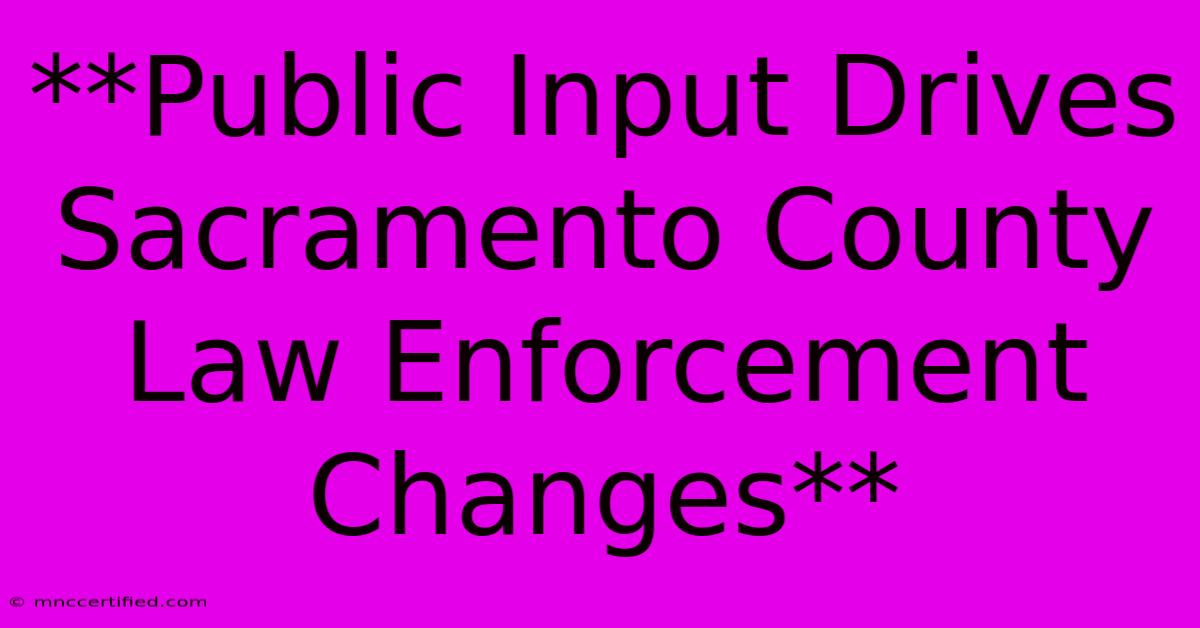**Public Input Drives Sacramento County Law Enforcement Changes**

Table of Contents
Public Input Drives Sacramento County Law Enforcement Changes
The Sacramento County Sheriff's Department is undergoing a significant transformation, driven by a renewed focus on community engagement and public input. This shift, spurred by a growing desire for accountability and reform within law enforcement, is reshaping the department's approach to policing.
A Call for Change: Voices of the Community
The call for change resonated throughout the county, echoing concerns about racial disparities in policing, excessive use of force, and a lack of transparency. Community forums, town hall meetings, and online surveys provided platforms for residents to share their experiences and advocate for a more responsive law enforcement system.
Key Themes Emerging from Public Input:
- Increased Transparency and Accountability: Demands for clear, accessible data on arrests, use of force, and internal investigations.
- Community Policing and Collaboration: Calls for building trust and fostering positive relationships between law enforcement and diverse communities.
- Mental Health and Crisis Intervention: Emphasis on equipping officers with the skills and resources to handle mental health crises and divert individuals from the criminal justice system.
- De-escalation and Alternatives to Force: Prioritizing de-escalation tactics and exploring non-lethal alternatives to address volatile situations.
Implementing Change: A Collaborative Approach
The Sacramento County Sheriff's Department has taken a proactive approach to addressing these concerns, actively engaging with community leaders, advocacy groups, and residents to implement meaningful changes.
Notable Initiatives:
- Community Oversight Board: The creation of an independent oversight board, comprised of community members, to review complaints, provide recommendations, and enhance transparency.
- Body-Worn Camera Program: Expanding the use of body-worn cameras for all deputies, providing an objective record of interactions and enhancing accountability.
- De-escalation Training: Implementing comprehensive de-escalation training for all officers, emphasizing communication skills, cultural sensitivity, and conflict resolution.
- Mental Health Response Teams: Partnering with mental health professionals to create specialized response teams that can address mental health crises and divert individuals from the criminal justice system.
A Journey of Progress: Challenges and Opportunities
While significant progress has been made, the journey towards equitable and responsive law enforcement is ongoing. Challenges remain, such as building lasting trust, addressing systemic issues, and ensuring that all communities have a voice in the process.
Looking Ahead:
- Continued Community Engagement: Sustaining open dialogue and feedback channels to ensure that community input continues to shape law enforcement policies and practices.
- Data-Driven Decision-Making: Utilizing data and research to evaluate the effectiveness of implemented changes and identify areas for further improvement.
- Transparency and Communication: Promoting transparency through regular reporting, clear communication channels, and readily accessible information about law enforcement activities.
The transformation of the Sacramento County Sheriff's Department is a testament to the power of public input. By actively engaging with the community and prioritizing accountability, the department is taking steps towards a more equitable and responsive law enforcement system, ensuring that all residents feel safe and protected.

Thank you for visiting our website wich cover about **Public Input Drives Sacramento County Law Enforcement Changes** . We hope the information provided has been useful to you. Feel free to contact us if you have any questions or need further assistance. See you next time and dont miss to bookmark.
Featured Posts
-
Ivanka Trump Joins Father At Event
Nov 07, 2024
-
Boardmasters Festival Security Measures For 2025
Nov 07, 2024
-
Benfica Vs Bayern Kick Off Delay Explained
Nov 07, 2024
-
Lurie In Front In San Francisco Mayoral Election
Nov 07, 2024
-
Can I Get A Prescription Without Insurance
Nov 07, 2024